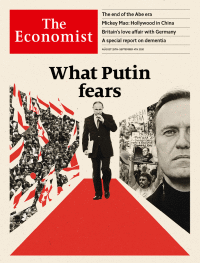Hamilton Nolan points out that the changes at the Wall Street Journal announced last month to provide more “value-added” coverage to the paper is simply what The Economist has been providing to its readers for years.
Nolan wrote, “The fact that the editorial stance of the magazine is to say what it means is surprisingly jarring to US readers used to popular publications that have been hammered marshmallow-soft by the various protestations of Fox News and liberal bloggers.
“The Economist eschews equivocation, which is refreshing whether you agree with its actual point or not. An article about Somalia contains only a single quote, which characterizes the local warlords as ‘absolute bastards.’ A headline to the lead article about Europe helpfully points out to the time-starved reader, ‘The European Union’s two newest members, Bulgaria and Romania, are both economically and politically backward.’
“In America, any such politically incorrect analysis would be made only for effect, to reinforce a political attack – ‘and Bulgarians and Romanians are ugly,’ it would add. But The Economist writes forcefully not to get a rise out of its readers, but to give them something with actual value: a well-considered viewpoint.
“‘We write about the world each week because it matters, not when it matters,’ says Paul Rossi, The Economist‘s North American publisher. ‘Every week, we cover the Middle East; other magazines cover it when it’s news. So I think we come at the market with a product that’s different.'”
OLD Media Moves
Economist already doing what WSJ plans to offer
January 12, 2007
Hamilton Nolan points out that the changes at the Wall Street Journal announced last month to provide more “value-added” coverage to the paper is simply what The Economist has been providing to its readers for years.
Nolan wrote, “The fact that the editorial stance of the magazine is to say what it means is surprisingly jarring to US readers used to popular publications that have been hammered marshmallow-soft by the various protestations of Fox News and liberal bloggers.
surprisingly jarring to US readers used to popular publications that have been hammered marshmallow-soft by the various protestations of Fox News and liberal bloggers.
“The Economist eschews equivocation, which is refreshing whether you agree with its actual point or not. An article about Somalia contains only a single quote, which characterizes the local warlords as ‘absolute bastards.’ A headline to the lead article about Europe helpfully points out to the time-starved reader, ‘The European Union’s two newest members, Bulgaria and Romania, are both economically and politically backward.’
“In America, any such politically incorrect analysis would be made only for effect, to reinforce a political attack – ‘and Bulgarians and Romanians are ugly,’ it would add. But The Economist writes forcefully not to get a rise out of its readers, but to give them something with actual value: a well-considered viewpoint.
“‘We write about the world each week because it matters, not when it matters,’ says Paul Rossi, The Economist‘s North American publisher. ‘Every week, we cover the Middle East; other magazines cover it when it’s news. So I think we come at the market with a product that’s different.'”
Read more here.
Media News
CNBC taps Sullivan as “Power Lunch” co-anchor
December 23, 2024
Media News
Business Insider hires Brooks as standards editor
December 23, 2024
Media News
Is this the end of CoinDesk as we know it?
December 22, 2024
Media News
LinkedIn finance editor Singh departs
December 21, 2024
Media Moves
Washington Post announces start of third newsroom
December 20, 2024
Subscribe to TBN
Receive updates about new stories in the industry daily or weekly.